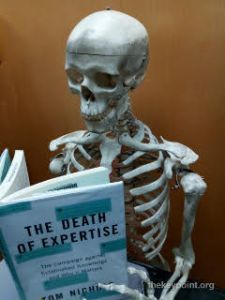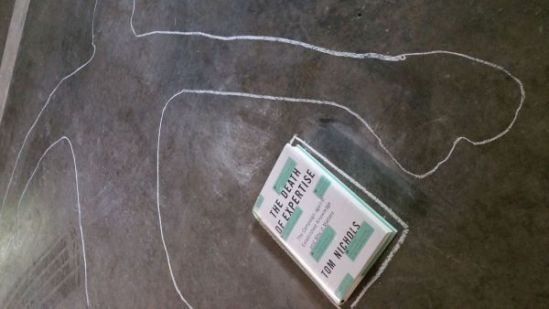
The Death of Expertise: The Campaign against Established Knowledge and Why it Matters
by Tom Nichols
This book is about the erosion of respect for facts, logical analysis, and critical thinking. Uninformed opinions carry the same weight as expert opinions. There is no vetting of dubious sources from credible sources. Beliefs are conflated with facts. It is in this climate that hoaxes, conspiracy theories, fake news, propaganda, and all manner of bullshit thrive. Tom Nichols, professor of national security at US Naval War College, examines this phenomenon and some of the causes, including higher education, technology, and the news media.
“In modern America, policy debates sound increasingly like fights between groups of ill-informed people who all manage to be wrong at the same time… Whether about science or policy, however, they all share the same disturbing characteristic: a [self-absorbed] and thin-skinned insistence that every opinion be treated as truth.”
“The social psychologist Jonathan Haidt summed it up neatly when he observed that when facts conflict with our values, ‘almost everyone finds a way to stick with their values and reject the evidence.’”
Nichols notes that this is not just a problem among undereducated pockets of the country. “Low rates of participation in child vaccination programs are actually not a problem among small-town mothers with little schooling… The parents more likely to resist vaccines, as it turns out, are found among educated San Francisco suburbanites in Marin County.”
“Of course, there’s also the basic problem that some people just aren’t very bright… Many people simply cannot recognize the gaps in their own knowledge or understand their own inability to construct a logical argument… Dunning-Kruger Effect, in sum, means that the dumber you are, the more confident you are…” Nichols also discusses confirmation bias, innumeracy, and the scientific method.
One factor contributing to the acceptance of bad information is the desire to avoid conflict. “In 2014… researchers found that the less capable people advocated for their views more than might have been expected, and the more competent member of the conversation deferred to those points of view even when they were demonstrably wrong… This might make for a pleasant afternoon, but it’s a lousy way to make a decision… The reality is that social insecurity trips up both the smart and the dumb. We all want to be liked.”
“Higher education is supposed to cure us of the false belief that everyone is as smart as everyone else. Unfortunately… rather than disabusing students of their intellectual solipsism, the modern university ends up reinforcing it.”
The author tells the story of a Dartmouth student challenging a renowned astrophysicist. “The student, realizing that a scientist at a major university was not going to change his mind after a few minutes of arguing with a sophomore, finally shrugged and gave up. ‘Well,’ the student said, ‘your guess is as good as mine.’” This is an example of the death of expertise. “The guesses of an experienced astrophysicist and a college sophomore are not equivalently good.”
“Colleges and universities also mislead their students about their own competence through grade inflation… At Wellesley, humanities departments tried to cap the average grade at a B+ in their courses; those courses lost a fifth of their enrollments and the participating departments lost nearly a third of their majors… The two most important facts about grade inflation, however, are that it exists and that it suffuses students with an unwarranted confidence on their abilities… Unearned praise and hollow successes build a fragile arrogance in students that can lead them to lash out at the first teacher or employer who dispels that illusion, a habit that proves hard to break in adulthood.”
“Campuses in the United States are increasingly surrendering their intellectual authority not only to children, but also to activists who are directly attacking the traditions of free inquiry that scholarly communities are supposed to defend… The current fads on campus, including ‘safe spaces’ and speech codes, do in fact corrode the ability of colleges to produce people capable of critical thought, [i.e.] the ability to examine new information and competing ideas dispassionately, logically, and without emotional or personal preconceptions.”
“What is different today, and especially worrisome when it comes to the creation of educated citizens, is how the protective, waddling, environment of the modern university infantilizes students and thus dissolves their ability to conduct a logical and informed argument. When feelings matter more than rationality or facts, education is a doomed enterprise.” This reminds me of a line from The End of Education by Neil Postman: “Public education does not serve a public. It creates a public.”
“Technology has created a world in which we’re all Cliff Clavin now.”
“When a group of experimental psychologists at Yale investigated how people use the Internet, they found that ‘people who search for information on the Web emerge from the process with an inflated sense of how much they know—even regarding topics that are unrelated to the ones they Googled.’ This is a kind of electronic version of the Dunning-Kruger Effect, in which the least competent people surfing the web are the least likely to realize that they’re not learning anything.”
“A University College of London (UCL) study found, people don’t actually read the articles they encounter during a search on the Internet. Instead, they glance at the top line or the first few sentences and then move on.”
“The Internet creates a false sense that the opinions of many people are tantamount to a ‘fact.’ … As James Surowiecki (the Wisdom of Crowds writer) pointed out, saying that ‘cognitive diversity’ is important—meaning that many views can be better than one—it does not mean that if ‘you assemble a group of diverse but thoroughly uninformed people, their collective wisdom will be smarter than an expert’s.’”
“The major problem with instantaneous communication is that it’s instantaneous… Sometimes, human beings need to pause and reflect, to give themselves time to absorb information and to digest it. Instead, the Internet is an arena in which people can react without thinking, and thus in turn they become invested in defending their gut reactions rather than accepting new information or admitting a mistake.”
“Learning new things requires patience and the ability to listen to other people. The Internet and social media, however, are making us less social and more confrontational. Online, as in life, people are clustering into small echo chambers, preferring only to talk to those with whom they already agree.”
“Meanwhile, scholars and professionals who insist on logic, foundational knowledge, and basic rules about sources risk condemnation by twenty-first-century online users as nothing more than elitists who do not understand the miracles of the Information Age.”
“Journalism is now sometimes as much a contributor to the death of expertise as it is a defense against it… This fusing of entertainment, news, punditry, and citizen participation is a chaotic mess that does not inform people so much as it creates the illusion of being informed…This morphing of news into entertainment stretches across every demographic.”
“The modern media, with so many options tailored to particular views, is a huge exercise in confirmation bias. This means that Americans are not just poorly informed, they’re misinformed… And, of course, the most misinformed citizens ‘tend to be the most confident in their views and are also the strongest partisans.’”
The people who staged a “chocolate helps you lose weight” hoax explained: “‘The key is to exploit journalists’ incredible laziness. If you lay out the information just right, you can shape the story that emerges in the media almost like you were writing those stories yourself. In fact, that’s literally what you’re doing, since many reporters just copied and pasted our text.’”
“People skim headlines or articles and share them on social media but they do not read them.” This is particularly dangerous because headlines are often misleading.
Nichols has advice for consumers of news: “Be ecumenical…. You wouldn’t eat the same thing all day, so don’t consume the same sources of media all day…. Don’t be provincial: try media from other countries, as they often report stories or have a view of which Americans are completely unaware… And be a lot more discriminating.”
“One of the most common errors experts make is to assume that because they are smarter than most people about certain things, they are smarter than everyone about everything… Entertainers are the worst offenders here… This creates bizarre situations in which experts in one field—entertainment—end up giving disquisitions on important questions in other fields… The expert community is full of such people. The most famous, at least if measured by impact on the global public, is the MIT professor [of linguistics] Noam Chomsky… having written a stack of books on politics and foreign policy… He is no more an expert in foreign policy than, say, the late George Kennan was in the origins of human language.”
“And this, sadly, is the state of modern America. Citizens no longer understand democracy to mean a condition of political equality, in which one person gets one vote, and every individual is no more and no less equal in the eyes of the law. Rather, Americans now think of democracy as a state of actual equality, in which every opinion is as good as any other on almost any subject under the sun. Feelings are more important than facts: if people think vaccines are harmful, or if they believe that half of the US budget is going to foreign aid, then it is ‘undemocratic’ and ‘elitist’ to contradict them.”
Nichols may be preaching to the choir.
Nichols, Tom. The Death of Expertise: The Campaign against Established Knowledge and Why it Matters. New York: Oxford University Press, 2017. Buy from Amazon.com
Disclosure: As an Amazon Associate I earn from qualifying purchases.

6 thoughts on “The Death of Expertise”
Comments are closed.